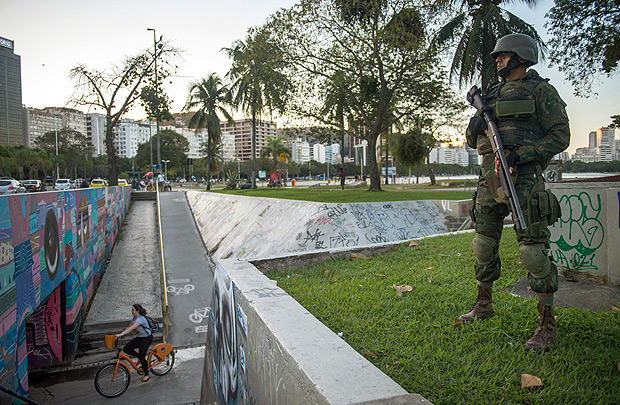Latest Photo Galleries
Brazilian Markets
17h34 Bovespa |
-0,32% | 124.741 |
16h43 Gold |
0,00% | 117 |
17h00 Dollar |
+0,38% | 5,1487 |
16h30 Euro |
+0,49% | 2,65250 |
ADVERTISING
Fears Makes Rio de Janeiro Residents Change Habits and Leaves Bars and Restaurants Empty
10/23/2017 - 10h37
Advertising
MARINA ESTARQUE
SPECIAL ENVOY TO RIO DE JANEIRO
Architect Rogério Mendes, 41, has been held up at gunpoint and had his car stolen four times. He and his wife live in Grajaú, a neighborhood in the north zone of Rio de Janeiro, and now go out to bars and restaurants less often.
"We don't go to certain places by car any more. We worry about what could happen on the way, or when we are parking, everything. We used to go out in Tijuca and we stopped doing that. Sometimes we go to the south zone, but by taxi."
Instead, the couple invites friends over for drinks at their home. "We don't go out as often as we used to. It is expensive to take taxis."
The violence in the city has discouraged many Rio de Janeiro residents, who, like Mendes, are now afraid to go out at night, and led to changes in their habits as well as in the city's cultural characteristics.
The soaring levels of crime coupled with the economic crisis have greatly affected the sector of bars and restaurants. The confrontation in the city's slums in recent weeks, which mainly affected those regions' residents, worsened the scenario and produced negative consequences in the night life of other areas.
At the end of September bars and restaurants in Leblon, Gávea and São Conrado, neighborhoods near Rocinha slum, had a 60% decline in the number of customers in days of heavy confrontation in that slum. The survey was carried out by SindRio (the Rio de Janeiro Union of Bars and Restaurants).
Neighborhoods in the city center, such as Santa Teresa, and in the north zone, such as Tijuca and Vila Isabel, have also been affected by criminality. On 28 de Setembro boulevard alone, a traditional samba region in Vila Isabel, 68 bars and restaurants closed their doors in recent months.
Many of the local residents interviewed by Folha said that in the past months they have felt a "strange atmosphere" in the streets after sunset.
Psychologist Fernanda Memere, 27, who lives in Tijuca, says that she avoids walking in the streets when she goes out at night.
"There have been many hold-ups, even in very busy places. There is something strange in the air. Recently I went to the shopping mall with a friend at 7:00 p.m. and we took an Uber because we didn't want to risk walking there," says Memere.
Translated by THOMAS MUELLO
Read the article in the original language
| Mauro Pimentel/AFP | ||
 |
||
| Military troops patrol Botafogo neighbourhood in Rio de Janeiro, Brazil |



